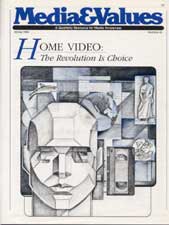China's Challenge: Modernize, not Westernize
|
This article originally appeared in Issue# 42
|
A 4,000-year-old culture looks for its own way to use modern media.
From the back of the crowded classroom, a young man raised his hand. "Tell us about Hol-lee-wood." he asked in halting English.
I smiled at his question but inside, I chuckled. Here I was, far from my desk in Los Angeles, spending a rare but exciting few days with the next generation of communications teachers and educational technologists at South China Normal University in Guangzhou (Canton), and I couldn't escape Hol-lee-wood.
I answered his question the best I could, emphasizing that the United States media industry operates on only one principle — and I put a "$" sign on the chalkboard. "Hollywood is home to many talented people who work hard to create television and movies that will be seen all over the world," I explained. "But very few productions get made there unless they have the potential of making a financial profit for the owners and investors."
The students stared at me blankly. Money. Profit. Ownership. Foreign words from this foreign woman. I realized it would take a course in economics, rather than communications to answer his question. It was the first of many lessons I learned from my time with these eager young students.
I had come to China to visit a friend — Janice Engsberg, Ph.D., a former staff member at the United Church of Christ Office of Communication, now a "foreign expert" in the thriving new department of Educational Communication and Technology at this regional teachers college. With over 150 students, both undergraduate and at the Masters' level, the school is the only academic department of its kind in all of China. Its graduate students are considered the cream of the crop.
Having heard of this reputation I expected to find enterprising young people producing creative television and video.
At the very least, I anticipated seeing videotapes being made to support China's development goals — perhaps there would be programs on agriculture or nutrition or health care. With the new lightweight cameras and VCRs, it would be easy, I thought, to create short programs on many subjects and distribute them at low cost throughout the country.
Another lesson: this was not UCLA Film School. Or even Television 101 in any local junior college.
While there is a decades-old heritage of a creative film production community in both Shanghai and Beijing, the emphasis in the rest of China today is on using communications for the basics: telecommunications for business and industry; news and information for politics; and communications technology for education. A current goal for China is to provide all of its school-age children with a minimum ninth-grade education. With 80 percent of China's population in rural areas served by millions of teachers who know little more than their students the only way this can be accomplished in the next few years is with educational technology, particularly satellite delivery of teacher training materials and basic educational programs — biology! mathematics, geography history. The crucial media building blocks for China's educational goals today are instructional videotapes, slides, even overhead transparencies.
And "Dr. Jan's" students are preparing to provide the technological support that will be needed to produce them in regional audio-visual centers and satellite down-link stations throughout China.
Few of these students are in Canton by their own initiative. Most were "assigned" this area of higher education by their homework unit and are expected to return with the skills they were sent to learn. A key course for all of them is a hands-on equipment repair laboratory. Indeed the ability to repair a broken projector or replace a crucial microchip may be a most valuable skill on some not-so-distant thy.
But theft first task will be to teach the teachers and conduct basic research. Having made high scores on the national entrance exams, the current graduate students were in the first class of students to continue their education when the universities were reopened after the Cultural Revolution. As teenagers many had been sent to work in the fields. Now in their late 20s, they are eager, enthusiastic and hardworking students who, after graduation, will bring much-needed technical expertise to schools and educational systems that were sadly neglected for many years.
My time with them was short but I was impressed with their budding media sophistication. A videotape on oil manufacturing, produced for chemistry classes, for example, was quite interesting to watch, even if I could not understand the narration! The music soundtrack, charts and graphics, camera angles and editing were all good quality and captured my attention.
Granted there was a lack of jazzy special effects but in a country that can hardly imagine the possibility of "31 flavors," plain vanilla is still a treat.
One comes away from even a few days in China with a great admiration for the challenges faced by Chinese media, and the Chinese society in general. Not only in media but in all aspects of life, China wants to be modernized but not necessarily westernized. Their search is for a third way between socialism and capitalism, and a visit to their pre-consumer society is like going hack to an innocent time. It is a refreshing break from the media-saw-rated environment the rest of the world is struggling to make peace with.
Certainly it will not last for tong. But I have no doubt that, despite my young friends curiosity about Hollywood's glitz and glamour, the media society that China is creating will be more influenced by the needs and gifts of its people along with, of course, 4000 years of civilization.



